Lee Jackson in conversation with
Marissa Nadler
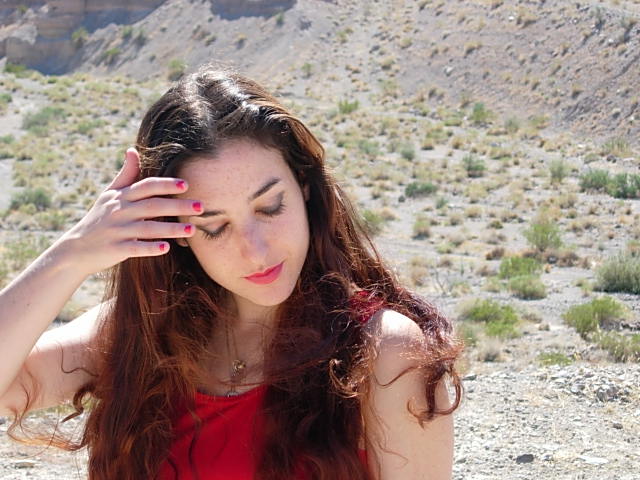 Folk chanteuse and songwriter Marissa Nadler possesses
one of the most striking voices to emerge from the underground in recent
years. It’s a voice that sounds like it should be emanating from a
phonograph player in a dusty parlour tucked away at the back of an old
Victorian home. Her subjects occupy a similar sepia toned universe where
fact and fiction merge into the dream world of folklore and come alive
through song. Marissa’s music has an immensely mythical aura, and her rich,
operatic mezzo soprano is the perfect conveyance for her vivid, and
occasionally morbid, tails to spring to life.
Folk chanteuse and songwriter Marissa Nadler possesses
one of the most striking voices to emerge from the underground in recent
years. It’s a voice that sounds like it should be emanating from a
phonograph player in a dusty parlour tucked away at the back of an old
Victorian home. Her subjects occupy a similar sepia toned universe where
fact and fiction merge into the dream world of folklore and come alive
through song. Marissa’s music has an immensely mythical aura, and her rich,
operatic mezzo soprano is the perfect conveyance for her vivid, and
occasionally morbid, tails to spring to life.
There’s nothing morbid or
downbeat about her abilities though or her actual music, which often soars
far above the cold ground that inspires it.
Combining a sage understanding of the acoustic guitar and the story song
with a unique self-taught vocal style, she manages to invoke the spirits of
many great singers past while still sounding completely modern and original.
Two albums have surfaced so far on the Eclipse label, “Ballads of Living and
Dying” and the recent “Saga of Mayflower May” (featuring artwork by the
Terrascope contributor, and Dream Magazine honcho, George Parsons). Both
come highly recommended for anyone who appreciates the early albums of
Leonard Cohen, Joni Mitchell, Mazzy Star and any kind of dreamy psychedelic
folk. Amid a newer breed of visionary female folk singers such as Josephine
Foster and Joanna Newsom, Nadler more than holds her own. This interview was
performed via email in October, 2005 as she was working with Ed Hardy of
Eclipse Records in the Mojave. And read closely; she’s looking for musicians
to accompany her live on the road.
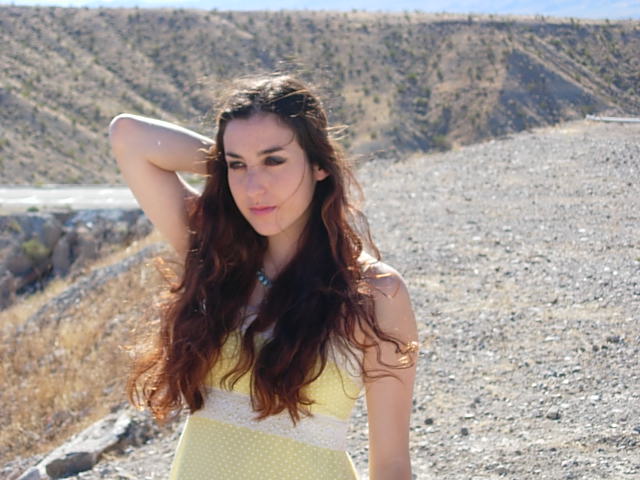
A lot has happened since last we talked. You've released an awesome new
album. You've toured Europe and just played a series of shows with the one
and only Jack Rose. What has changed for you as an artist in the last year?
I suppose I have gotten really encouraged to keep pursuing this path - to
know that there are people willing to listen in the deepest reaches of
places- I would never have imagined stepping into some of the most surreal
landscapes and strange interactions, singing in medieval churches in the UK,
in yurts.... Touring has really restored my faith in humanity - there are a
lot of great people in the world, little glass shards of wonder in the mire
of sadness that I feel resurrected from - and that just if one person
responds to one song, a 19 hour car ride listening to the same five CDs
feels worthwhile. Maybe getting an I-pod would be good.. What has changed- I
don't wallow in melancholy so much after a bad set anymore- don't leave my
instruments in trunks of cars and consider giving up anymore - there is just
some strange force I feel pulled by.
How was this most recent tour?
The tour went really well- playing in a log cabin lodge in Big Sur, with the
wilderness - listening to Wooden Wand and the Vanishing Voice driving down
the pacific coast highway, with the gorgeous overlooks, I have to admit I
feel part of the land more so than ever before. It inspired me to look more
outward to the inspiration. I got to meet some musicians I really admire, I
won't name any names, but I got to meet some personal idols of mine.
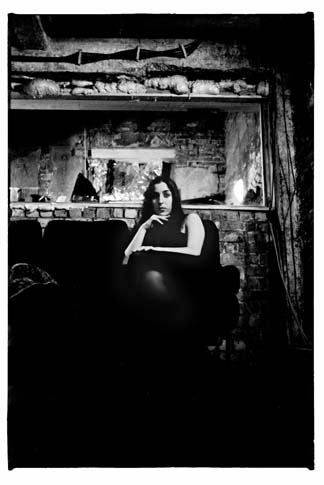 How are you coping with stagefright? I imagine Arthurfest was the biggest
crowd you've played so far.
How are you coping with stagefright? I imagine Arthurfest was the biggest
crowd you've played so far.
I was quite nervous, especially having to play in the daylight. I usually
play in the dark, and make the stage shut off all the lights. This forced me
to develop a thicker skin and I wasn't able to hide behind shrouds of
ambient lighting. I had to deal with the fact that people were looking at me
and could see me. The set was really well received and it was extremely
encouraging. I just closed my eyes through the entire set and tried to
travel to some deep seated room in my head. Each show I play, I realize that
my nerves are getting better- there are things about playing live that you
have no control over, and it’s important to keep perspective. There are
things like your voice warbling, sound problems that give the set character.
I’ve learned to give up a little bit to fate.
Jack is one of the most amazing guitarists around today. Did you two ever
play together?
Jack and I did not play together- but I must admit touring with such a
veteran really toughened me up. He is a real professional and taught me a
lot about how to get it done. Also, I have picked up a few tricks on the
slide guitar and some new open tunings from him.
Your new album and ‘Ballads of Living and Dying’ are almost sister
albums, with thematic links and recurring characters. What are the
differences between the two? To me this one sounds more ethereal, deeper
vocally, more harmonies....
I was a lot older in many ways when I wrote the second record- not talking
about age of course. The second record I am a bit sullied, lurking in the
mire of some haunting experiences that left me with the need to write about
them. I suppose. A confidence is evident there that wasn't there before.
What haunts you?
Loneliness is a pretty recurring haunt in life, I would say. I’m in Arizona
right now helping out at Eclipse and at night the wind is extreme, during
the day the sun is brutal, and there is nothing but this development in the
middle of absolute nowhere. The Mojave desert, complete with roaches,
crickets, and desolation, the hills of desert lands in the background… Of
course boxing records is fun - and I am catching up on all of this new
music. But, generally, I would say the same things haunt all people in life,
you know?
How would you characterize your relationship with death?
I think of death as the great release, sometimes, a final release from woe
and despair. Of course, I think I’m more fascinated not with death itself
but with how it affects the people left behind. My songs are more about the
people left behind than just one dead person. I am pretty intrigued with
life in general, and death is just part of the natural cycle of being.
How did you learn to play guitar?
My older brother taught me when I was very young, and I took his
fingerpicking technique. He moved away to college, and I started writing. It
took a long time for me to get it down, lots of practice fingerpicking - I
should have started lefty but there was only the one righty guitar in the
house. By the time I finally could play, years later, it was too late to
switch.
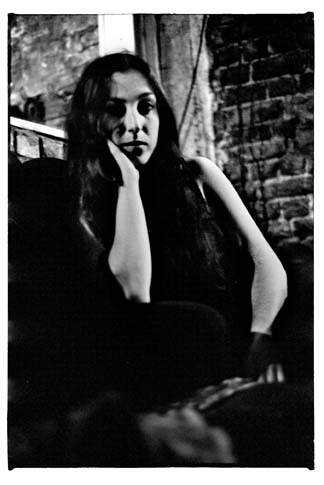 Influences: I know you're a big fan of Joni Mitchell and Leonard Cohen.
Who else? Your songs seem to me to combine elements of American and European
folk and pop, yet vocally you're not easy to pin down (which is a grand
thing!)
Influences: I know you're a big fan of Joni Mitchell and Leonard Cohen.
Who else? Your songs seem to me to combine elements of American and European
folk and pop, yet vocally you're not easy to pin down (which is a grand
thing!)
My influences come from lots of things- Nina Simone, Odetta, Big Mama
Thorton, Elizabeth Cotten, Billy Holiday, Bessie Smith, Patsy Cline, Blind
Willie McTell, Leadbelly, Robert Johnson, - all of those people sang from
the depth of their bellows- from experiences and pain. I like the grit,
although I don't sing with the grit, my influences are early American blues,
and later hybrids of that. Their music has resonated with me throughout my
life. I grew up listening to Nina Simone, a later hybrid I would say of
blues, soul, Motown, cassette tapes. A lot of my influences come from
painters though, because I painted for so long, I kind of try to put
paintings in my head.
When did you write your first song and what was it about?
At the very beginning, there were a bunch of Dylanesque songs, yet this was
when I was quite young, and they were songs about things that I was too
young to have experienced yet first hand - love, heartbreak, death,
desperation, the moment... the usual fodder. I worshipped all of these
singers I was listening to, and spent much time just learning how to sing
and play. The first one that I remember actually being convinced was
actually a song worthy of not being scrapped was when I was about 18 or 19,
having been writing since I was about 15. I was in a painting seminar for
college credit, taking a course in painting in Rome when I was in school. I
was standing on a bridge and I saw these dead dogs floating in the water. I
wrote some lyrics about the these heavy waterlogged corpses floating in what
was supposed to be a picturesque scene. I worked on the lyrics of the song
for months; it was the first song I recorded.
Leave it to floating dead things to get you thinking. Was Dylan an
important voice to you? He at least serves as a bridge to a lot of those
older, grittier folksingers of the past.
Yes, definitely- I had a big songbook of his and I spent a lot of time
learning how to play and sing at the same time by going over his simple yet
elegant chord progressions. My favorite songs of his are ‘Farewell
Angelina,’ ‘Visions of Johanna,’ ‘Desolation Row.’ I liked when he was
writing all the surrealist lyrics, which no doubt has some psychotropic
influences. In fact, I just saw the documentary Scorcese did and it was
really interesting to me to see all the live footage, especially of Odetta
and Lady Day.
Have you ever heard any Jackson C. Frank?
No - the name sounds familiar though.
Did you always know you wanted to write and play songs for a living? Are
you still painting?
No, I never considered music as a career until recently. I always felt too
shy to have the right personality to make it in such an image oriented
field. I wanted to be a painter for as long as I can remember, and music was
a side thing. But, as I grew out of that dream of being a reclusive painter,
that boho idealism, the expressiveness I got out of singing took over from
anything I got from painting. It felt more real to me, and it was new and
fresh, because I’m not trained, so I was coming at singing from an outsider
art perspective, which I find freeing. I still do some drawing and
woodcarving of birds and things like that, but nowhere near as often as I
write songs. I think I just found my calling a bit later in life, but the
art training helped my writing in terms of the visual world giving me
stimulation.
I think you should paint your next album cover; or better yet, get Ed
Hardy to release a special limited wood carving edition.
I’ll keep it into consideration- I definitely expect to paint part of my
next album, but I also have some amazing friends that are artists. One in
particular, Rachel Mosler, is going to do the cover for the next one. I just
think people should see her artwork. It’s absolutely breathtaking what she
does. My mother I also expect to have some artwork from, who is also a great
painter. I kind of want it a communal effort in some ways, you know? A labor
of love.
Tell me some about finding your voice. There's something very direct in
what you do, stripped down. You don't seem really concerned with being
overly arty or weird as much as conveying a palpable emotion, and that's
kind of a rare today in terms of "psychedelic folk."
I try to just sing the way I sing, the way I have always sung. As I grow
older, I find that I am a lot less inhibited, because I used to be too shy
to even sing in front of anyone. I still make my friends close their eyes
when I sing them a song, because I don't like being looked at when I sing.
But, I have gotten a little better and now I don't have to turn all the
lights off. But, you know, I just like to sing.
How did you come to meet Brian McTear? Could you say a few words about
working with him and Amy Morrissey on "The Saga of Mayflower May"? It's
really a phenomenal production.
I think it was Greg Weeks of the Espers maybe that recommended I record with
him. I can't remember for sure. But, I must say that Brian and Amy are both
amazing. Amy does these great plaster paintings of the Virgin Mary that are
so beautiful. They are both super nice people, with great vintage recording
equipment. They have a giant plate reverb machine, lots of stuff I found fun
to play with. I got to use their guitars also, better than using my beat up
disaster. But, generally, they were really open to whatever, each song was
done live. It was a good experience.
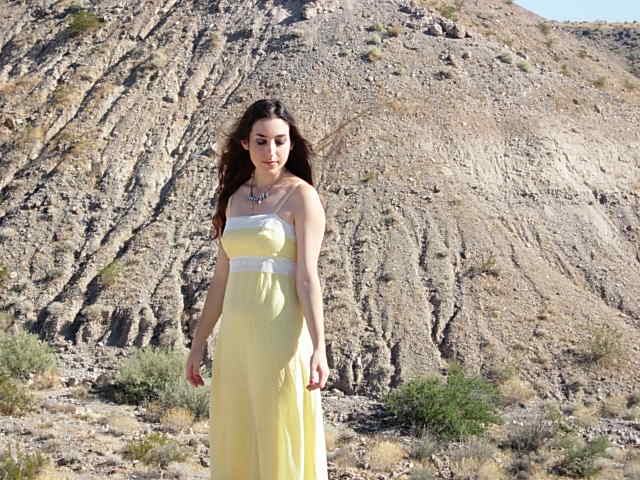
Could you talk some more about the inspiration for your lyrics--pictures,
stories, paintings, old folk songs, travel (inward and outward), etc...?
Some of my favorite fine artists are Adolf Wolfli, Henry Darger, Dianne
Arbus, Egon Shiele, Giaccommetti - and I think the defining link in them all
is that they express this fragility of the human emotion, and this bleak
loneliness that runs through the terrain of so many lives. That kind of
aesthetic has always appealed to me, for some reason. Those were my first
loves, my first dates. Picasso's blue period and rose period I have always
found beautiful, and sometimes I imagine myself in one of those absinthe
hazed scenes, and write soundtracks for these scenes I imagine; or putting
myself in some Weimar Rebulic scene, imagining singing in an old tavern
dressed like a dolly. Travel lately has inspired me to write. Right now, I’m
writing this from the Mojave. At night, it’s like an adobe Edward
Scissorhands, and certainly one of the most surreal places I’ve ever been.
Bleak, warm desert winds, and bugs crawling everywhere. There is definitely
inspiration in the land for me lately, and it’s important to look outwards,
not just inwards, for ideas.
How cool is working with Ed and Eclipse? I've said it many times: Eclipse is one of the best labels in the world today.
Ed Hardy is awesome. He is so supportive of his artists. I sent him a CD-R almost two years ago now via a recommendation from my friend Jeffrey Alexander from the now defunct Iditarod, and Black Forest/Black Sea [and currently event manager of Terrastock 6 of course] - and he was so easy to work with, letting the artist have complete creative control. He’s such a hard worker and a good example of someone who's hard work has paid off, I think.
Greg Weeks is another strong supporter, not to mention a gifted songwriter in his own right. What's it like working with him?
Well, I don't know yet. I’m going there this week to work with him - The first order of business is recording a cover of “Happiness is a Warm Gun” for a BBC compilation. And then we start tracking. I have a good feeling about it though. I love everything he has done, and I am really excited that he wants to work with me. Not to mention he is one of the most charismatic people I have met.
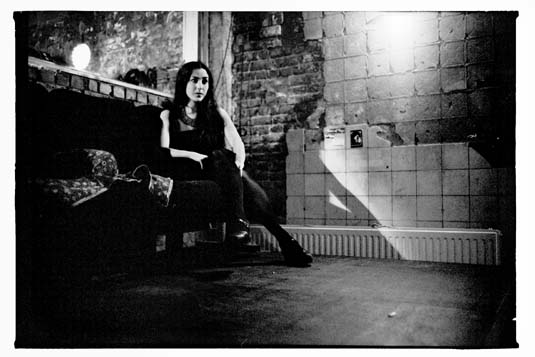
Could you ever see yourself performing in more of an ensemble setting, as Greg does with Espers?
Yes, definitely. It’s just a matter of finding people who want to be in a band and aren't tied down by domesticities and significant others and day jobs. So, the answer is yes, but I just haven't had luck hooking up with anyone that can travel. Basically, I’m looking for a pedal steel or lap steel player, and a good piano/keys/synth player who can also sing...lets consider it an advertisement. Know anyone?
Dreams for the future? What’s next?
Well, I am trying to live in the present, and remove expectation from my outlook. Yet, of course, I would like to be able to continue touring and releasing records, and I hope that people continue to be supportive.
Marissa Nadler was interviewed by Lee Jackson exclusively for Terrascope Online
Produced & directed by: Phil McMullen © terrascope.online 2005
Grateful thanks to Marissa for her time, effort, patience - and of course her beautiful songs.
More information available here: http://www.marissanadler.com/
